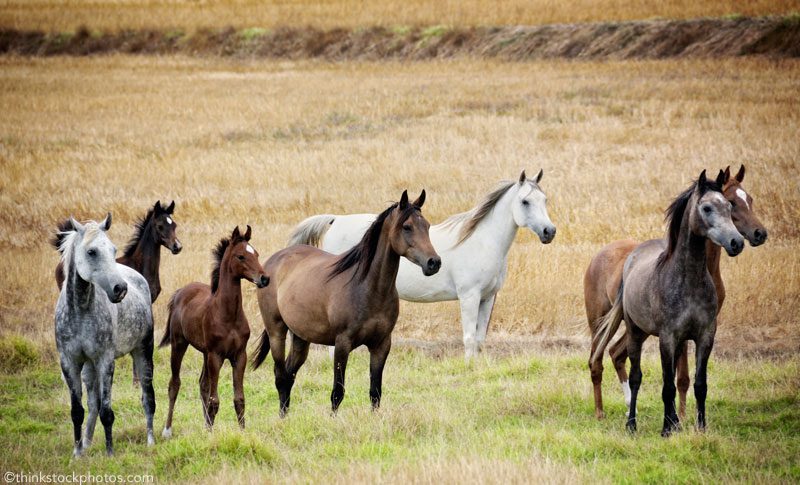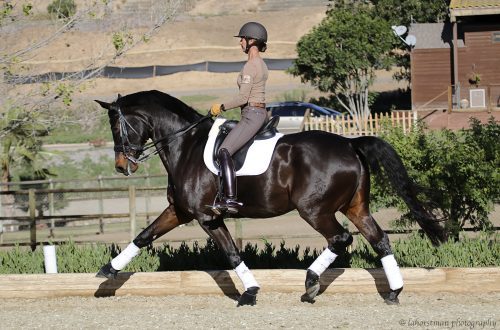
Hierarchy of horses in a herd. How to take your seat
Long riding trips through the mountains of the North Caucasus allowed me to observe the behavior of horses in “wild” herds that have minimal contact with humans.
Most of the horses in such a group have known each other for a very long time and their relationship is clearly established. But sometimes newcomers are forcibly added to the herd. This may be a new mare, substituted for a certain stallion, or a young animal given by a neighbor “brotherly” for growing on free grazing. But one way or another, all these horses know how to behave in society, because they grew up among other horses, repeating the behavior of the mother mare and those around them.
The leader can be seen immediately: he walks confidently, carries himself beautifully. He has the right to take food and drive away any horse, but usually uses this technique only if his leadership is not recognized or insufficiently recognized.
Subordinate horses listen to the leader and give way to everyone who is higher in the hierarchy, but they do not give way to those who are lower. At the very bottom of the hierarchy are animals that, for some reason, do not want or cannot subjugate others. But such from the danger and unfair attacks of the neighbors in the herd will be protected by the leader.
With the exception of attacks by wolves, which still occur to this day in the hungry months in the mountains, and capture by herdsmen (for sale, dressage or transfer to another place), the life of horses in wild herds is measured and calm.
The life of a domestic horse is much more difficult, especially if its owner is “not sitting down”, and he often transports it to a new place of residence from club to club.
How does a home-raised horse feel at the same time, when, as a sucker, she had to walk with her mother in a separate levada?
Uncomfortable and insecure. She has little experience and almost no one to learn from. A person, from the point of view of a horse, often behaves quite strangely and imitation of his behavior, most likely, will only worsen the opinion of the surrounding members of the herd about him.
A smart horse, not knowing anything about the correct behavior, having received several “kicks” from the new herd, begins to observe from the side. He tries to be discreet, non-aggressive, and learn from the most successful leaders how to establish a hierarchy.
If the knight is observant enough, then the next step is to catch a couple of horses with the lowest hierarchy on a walk and practice on them in establishing leadership. Most often this easily succeeds, and in such a company can be more confident start establishing relationships with other members of the herd.
If the horse is not particularly smart or simply impudent, does not evaluate its capabilities, then it can go ahead, risking severe beatings, bites, or even injury. The most difficult thing is for stubborn people who do not retreat and are ready to stand to the end. Here help should come in time a person, isolating the “hooligan” at least for the first time.
A horse that has arrived in a new herd or simply in a new place of residence may demonstrate inadequate, usually uncharacteristic behavior for it!
The animal understands that it is necessary to build relationships in society, but often does not know how to do it. Many behave too simply and stupidly, falling as a result to the very bottom of the herd hierarchy. Others try to fight by all the rules. Here they are helped by their own observation and experience, as well as those techniques that they have learned from other horses.
Let me give you an example: a two-year-old filly was purchased for my stable. Up to this point, her fate was unfortunate. After weaning from her mother, she was sold to the family as a gift for a child, where they built a small stable for her and settled her alone. The child was not up to the horse, and she lived for a whole year in a small barrel, communicating twice a day only with the groom, who took her out for a walk and asked for food.
What a shock the horse had when it was brought to the herd! She didn’t know how to behave at all. And at the same time, she was so glad to meet her own kind that even a camel was not afraid! She molested everyone, and in response received kicks and bites.
Fortunately, the horse turned out to be smart and for a whole week on the sidelines watched the behavior of the curly-haired Transbaikal mare, which was the clear leader in our herd (the vast experience of living in the wild conditions of Transbaikalia affected). A week later, she debuted to huge success. She managed to gain respect from other members of the herd and even make friends with the leader!
Given my many years of experience working and communicating with horses, acquiring and stabling them, I want to share some advice:
Having brought a horse to a new place, do not immediately release it into the herd on the first walk! If there is a separate levada next to the already herd animals, it is better to keep the newcomer as an observer for a week. Better first if possible introduce him to the calmest horses of the herd and then release them into the “light” in their company.
If you have just acquired a horse and are also a stranger to her, if possible, in front of her, talk to the leader of the formed herd. Walk with him in occasion, demanding obedience, reining down, concessions. This will greatly increase your credibility in the eyes of the new horse!
Do not be surprised by disobedience and even the possible manifestation of aggression in a new place – a horse, in order to earn the respect of others, tries in front of everyone act as dominant as possible.
When taking a horse for riding for the first time, do not conduct your lesson in front of a new herd, otherwise there is a risk that the horse will “show character” in front of his new neighbors and not obey you.
More often, whenever possible, observe the behavior of horses in herds, groups. Select leaders, guess the hierarchy. Learn behavior from the most successful leaders! Be a smart horse!
Irina Roven (Yasnopol Ecopark, yasnopole.ru)





